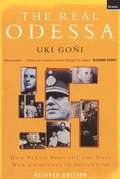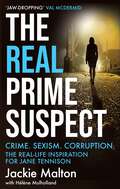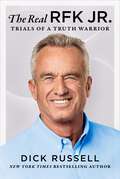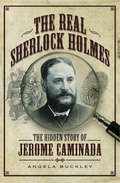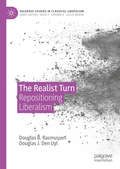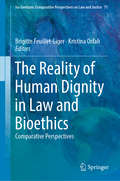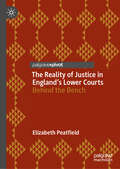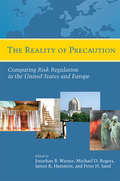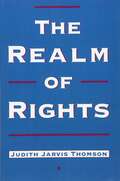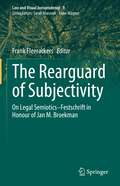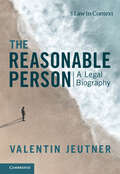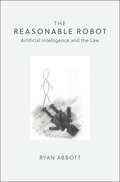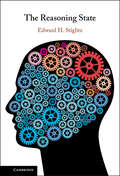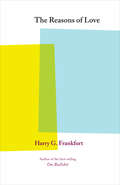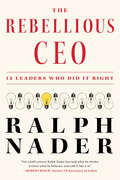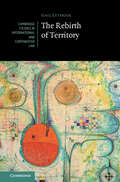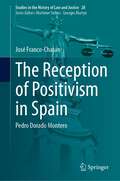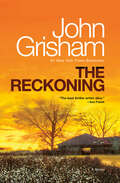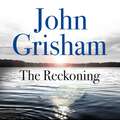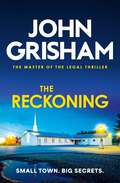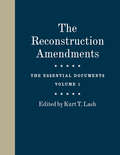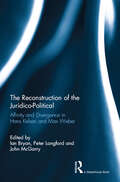- Table View
- List View
The Real Odessa: How Peron Brought The Nazi War Criminals To Argentina
by Uki GoniIt has long been known that Adolf Eichmann, Josef Mengele, Erich Priebke and many other Nazi war criminals found refuge in Argentina. In this book, a courageous Argentinian writer shows exactly how it was done, and reveals that the escapes were organized with the enthusiastic support of President Juan Peron. Even at this late date, when so much is known about the complicity of the Catholic Church and Allied intelligence agencies in the flight of the Nazis, Goni's material still has the power to shock. The paperback edition of The Real Odessa includes a revised introduction and conclusion, with a new afterword containing material that Uki Goni has recently researched and which focuses on Vatican complicity in providing sanctuary for war criminals.
The Real Prime Suspect: From the beat to the screen. My life as a female detective.
by Jackie Malton Hélène Mulholland'Jackie Malton lifts the lid on the jaw-dropping day-to-day realities that have faced women cops.' -Val McDermid'Jackie Malton was one of the women who blazed a trail in the very macho world of policing. She was indeed the real Prime Suspect, viewed with suspicion because of her gender and her sexuality and, while it took its toll, she stood out, proud and independent. She gave policing a good name. A terrific read!' -Baroness Helena Kennedy QC'Unputdownable. A uniquely personal journey through recent decades of policing. Searingly honest, shocking and funny.' -Barbara Machin, creator and showrunner, Waking the DeadJackie Malton was a no-nonsense girl from Leicestershire who joined the police force in the 1970s when women were kept apart from the men. Feisty and determined, Jackie worked in CID and the famous flying squad before rising to become one of only three female detective chief inspectors in the Metropolitan Police. In The Real Prime Suspect, Malton describes the struggles she faced as a gay woman in the Metropolitan Police, where sexism and homophobia were rife.Jackie dealt with rapists, wife beaters, murderers, blackmailers and armed robbers but it was tackling the corruption in her own station that proved the most challenging. Ostracised and harassed by fellow officers furious that she reported the illegality of some colleagues, Malton used alcohol to curb her anxiety.A chance meeting with writer Lynda La Plante five years later changed the course of her life. Together they worked on shaping Jane Tennison, one of TV's most famous police characters, in the ground-breaking series Prime Suspect. Not long after, Malton recovered from alcoholism and now works as an AA volunteer in prison and as a TV consultant.Jackie has spent her life working in crime. Now she's ready to share her story.'The story of a pioneer, a determined police officer who used her talent as a force for good. If it were not for women like Jackie, policing today would be very different.' -Colin Sutton, author of the Manhunt series'A fascinating account of Jackie Malton's remarkable career as a police officer, and how she used that experience to bring a new kind of authenticity to Prime Suspect and many other TV crime dramas and documentaries.' -Neil McKay, TV writer and producer, Appropriate Adult'Compelling, enlightening and totally gripping' -Angela Marsons
The Real RFK Jr.: Trials of a Truth Warrior
by Dick RussellAn epic biography filled with drama, conflict, and surmounted challenges.The Real RFK Jr. is an intimate biographical portrait examining the controversial activist's journey from anguish and addiction to becoming the country's leading environmental champion fighting government corruption, corporate greed, and a captured media. Written by his longtime colleague Dick Russell, the biography also exposes the misconceptions and explains the rationale behind Kennedy's campaign to protect public health. Provided exclusive source material, including access to Kennedy&’s unpublished writings and personal journals, the author conducted dozens of interviews with him as well as numerous friends and associates. Russell delves into everything from Kennedy&’s sometimes death-defying river rafting adventures to his pioneering legal cases against polluters such as Smithfield Foods and Monsanto, while founding the world&’s largest water protection group. The Real RFK Jr. also examines Kennedy&’s pursuit of the truth about the assassinations of his father and uncle, the wrongful murder conviction of his cousin, and the false narratives around the COVID-19 pandemic.
The Real Sherlock Holmes: The Hidden Story of Jerome Caminada
by Angela BuckleyThe life and law enforcement career of the legendary Victorian police detective: &“Caminada&’s story is a remarkable one . . . [a] fascinating book.&” —The Manc On December 6, 1886, Arthur Foster leaves the Queen&’s Theatre, Manchester, with a pocket full of gold and a lady bedecked with diamonds on his arm. He hails a hansom cab, unaware that a detective has been trailing him as he&’s crisscrossed the streets of the city. As the cab pulls away, the detective slips inside and arrests the infamous &“Birmingham Forger.&” The detective is Jerome Caminada, legendary policeman and real-life Victorian super-sleuth. A master of disguise with a keen eye for detail and ingenious methods of detection, Caminada is at the top of his game, tracking notorious criminals through the seedy streets of Manchester&’s underworld. Relentless in his pursuit, he stalks pickpockets and poisoners, unscrupulous con artists and cold-blooded murderers. His groundbreaking detective work leads to the unraveling of classic crime cases such as the Hackney Carriage Murder in 1889, secret government missions, and a deadly confrontation with his arch-rival, a ruthless and violent thief. Caminada&’s compelling story bears all the hallmarks of Arthur Conan Doyle and establishes this indefatigable investigator as one of the most formidable detectives of the Victorian era—and a real-life Sherlock Holmes. &“The real-life figure who inspired Sir Arthur Conan Doyle's infamous detective, Sherlock Holmes, may have been uncovered.&” —Daily Mail
The Realist Turn: Repositioning Liberalism (Palgrave Studies in Classical Liberalism)
by Douglas B. Rasmussen Douglas J. Den UylDouglas B. Rasmussen and Douglas J. Den Uyl maintain that a realist turn—namely, one in which the natural order is the basis for individual rights—is needed to bring about a proper understanding and defense of liberty. They argue that the critical character of individual rights results from their being tethered to metaphysical realism. After reprising their explanation and defense of natural rights, Rasmussen and Den Uyl explain metaphysical realism and defend it against neo-pragmatist objections. They show it to be a formidable and preferable alternative to epistemic constructivism and crucial for a suitable understanding of ideal theory.
The Reality of Human Dignity in Law and Bioethics: Comparative Perspectives (Ius Gentium: Comparative Perspectives on Law and Justice #71)
by Brigitte Feuillet-Liger Kristina OrfaliAdopting an interdisciplinary perspective, this volume explores the reality of the principle of human dignity – a core value which is increasingly invoked in our societies and legal systems. This book provides a systematic overview of the legal and philosophical concept in sixteen countries representing different cultural and religious contexts and examines in particular its use in a developing case law (including of the European Court of Human Rights and of the Inter-American Court of Human Rights). Whilst omnipresent in the context of bioethics, this book reveals its wider use in healthcare more generally, treatment of prisoners, education, employment, and matters of life and death in many countries. In this unique comparative work, contributing authors share a multidisciplinary analysis of the use (and potential misuse) of the principle of dignity in Europe, Africa, South and North America and Asia. By revealing the ambivalence of human dignity in a wide range of cultures and contexts and through the evolving reality of case law, this book is a valuable resource for students, scholars and professionals working in bioethics, medicine, social sciences and law. Ultimately, it will make all those who invoke the principle of human dignity more aware of its multi-layered character and force us all to reflect on its ability to further social justice within our societies.
The Reality of Justice in England’s Lower Courts: Behind the Bench
by Elizabeth PeatfieldThis accessible book provides an evaluative review of justice at the locus of the magistrates’ court. Written by a magistrate, this book uses different case studies to aid discussion of the principles of justice and the theoretical process of the criminal justice system in England and Wales. Its case studies consider individual and intersecting inequalities such as sex, race, class, mental health, sexuality, age, and disability. Speaking to students, policy makers and practitioners, readers can identify opportunities where justice can be developed, as well as the challenges to justice from numerous perspectives which play out in the magistrates’ court. A series of end-of-chapter questions encourage reflection and one chapter considers recommendations for the future of justice.
The Reality of Precaution: Comparing Risk Regulation in the United States and Europe
by James Hammit Michael Rogers Peter Sand Jonathan B. WienerThe 'Precautionary Principle' has sparked the central controversy over European and U.S. risk regulation. The Reality of Precaution is the most comprehensive study to go beyond precaution as an abstract principle and test its reality in practice. This groundbreaking resource combines detailed case studies of a wide array of risks to health, safety, environment and security; a broad quantitative analysis; and cross-cutting chapters on politics, law, and perceptions. The authors rebut the rhetoric of conflicting European and American approaches to risk, and show that the reality has been the selective application of precaution to particular risks on both sides of the Atlantic, as well as a constructive exchange of policy ideas toward 'better regulation.' The book offers a new view of precaution, regulatory reform, comparative analysis, and transatlantic relations.
The Realm of Rights
by Judith Jarvis ThomsonThe concept of a right is fundamental to moral, political, and legal thinking, but much of the use of that concept is selective and fragmentary: it is common merely to appeal to this or that intuitively plausible attribution of rights as needed for purposes of argument. In The Realm of Rights Judith Thomson provides a full-scale, systematic theory of human and social rights, bringing out what in general makes an attribution of a right true. <p><p> Thomson says that the question what it is to have a right precedes the question which rights we have, and she therefore begins by asking why our having rights is a morally significant fact about us. She argues that a person’s having a right is reducible to a complex moral constraint: central to that constraint is that, other things being equal, the right ought to be accorded. Thomson asks what those other things are that may or may not be equal, and describes the tradeoffs that relieve us of the requirement to accord a right. <p><p> Our rights fall into two classes, those we have by virtue of being human beings and those we have by virtue of private interactions and law. Thomson argues that the first class includes rights that others not kill or harm us, but does not include rights that others meet our needs. The second class includes rights that issue from promises and consent, and Thomson shows how they are generated; she also argues that property rights issue only from a legitimate legal system, so that the second class includes them as well. <p><p> The Realm of Rights will take its place as a major effort to provide a stable foundation for our deeply held belief that we are not mere cogs in a communal machine, but are instead individuals whose private interests are entitled to respect.
The Rearguard of Subjectivity: On Legal Semiotics – Festschrift in Honour of Jan M. Broekman (Law and Visual Jurisprudence #9)
by Frank FleerackersEdmund Husserl’s ideas, informed by Kant’s Critiques, constituted a point of departure when rereading philosophical problems of subject and subjectivity. In his “Phänomenologie und Egologie” (1961/63), Jan Broekman revealed how Husserl analysed the “Split Ego” notion in Kant’s vision, which became fundamental for his phenomenology. The form and function of subjectivity were likewise positioned in psychiatry and literature, as well as in aesthetics, as Jan Broekman’s texts on ‘cubism’ demonstrated. Problems of ‘language’ unfolded in studies on topics ranging from the texts of Ezra Pound to the dialogic insights of Martin Buber, all of which were involved in the development of semiotics. Two themes accompanied these insights: the notion and later Parisian mainstream called structuralism, and the urgent need to arrive at deeper insights into the links between Marxism and phenomenology. Central language concepts also played a part: as early as 1986, Jan Broekman published on ‘semiology and medical discourse’, and in 1992 on ‘neurosemiotics’, before addressing the link between speech act and (legal as well as social) freedom in 1993. In all these works, the subject and the atmosphere of subjectivity were essential aspects. In addition to his writing, Jan Broekman gave courses on current philosophical issues, law and medicine until retiring in 1996, and in his “Intertwinements of Law and Medicine” revisited subjectivity aspects, while also offering a synthetic view.In this Festschrift in honour of Jan Broekman, the contributions address the analogue/digital dichotomy in semiotics, the multicultural self in language and semiotics, semiology and legal discourse, the legal subject and the atmosphere of subjectivity, intertwinements of law and medicine, the semiotics of law in legal education, signs in law and legal discourse, making meaning in law, and legal speech acts.
The Reasonable Person: A Legal Biography (Law in Context)
by Valentin JeutnerJeutner argues that the reasonable person is, at heart, an empathetic perspective-taking device, by tracing the standard of the reasonable person across time, legal fields and countries. Beginning with a review of imaginary legal figures in the legal systems of ancient Egypt, Greece, and Rome, the book explains why the common law's reasonable person emerged amidst the British industrialisation under the influence of Scottish Enlightenment thinking. Following the figure into colonial courts, onto battlefields and into self-driving cars, the book contends that the reasonable person invites judges, jury-members, and lawyers to take another person's perspective when assessing their own or another person's conduct. The perspective of another is taken by means of empathy, by feeling what others might feel in a particular situation. Thus construed, the figure of the reasonable person can help us make more accurate judgments in a diverse world.
The Reasonable Robot: Artificial Intelligence and the Law
by Ryan AbbottToday, artificial intelligence (AI) and people do not compete on a level playing field. From a safety perspective, AI may be the best choice for driving a vehicle, but laws often prohibit driverless vehicles. At the same time, a person may be better at packing boxes at a warehouse, but a business may automate because AI receives preferential tax treatment. Or, AI may be better at helping businesses to innovate, but these same businesses may not want to use AI if doing so restricts future intellectual property rights. In The Reasonable Robot, Ryan Abbott argues that the law should not discriminate between people and AI when they are performing the same tasks, a legal standard that will help to eliminate market distortions and to ensure that decisions are made on the basis of efficiency. This work should be read by anyone interested in the rapidly evolving relationship between AI and the law.
The Reasoning State
by Edward H. StiglitzAdministrative bodies, not legislatures, are the primary lawmakers in our society. This book develops a theory to explain this fact based on the concept of trust. Drawing upon Law, History and Social Science, Edward H. Stiglitz argues that a fundamental problem of trust pervades representative institutions in complex societies. Due to information problems that inhere to complex societies, the public often questions whether the legislature is acting on their behalf—or is instead acting on the behalf of narrow, well-resourced concerns. Administrative bodies, as constrained by administrative law, promise procedural regularity and relief from aspects of these information problems. This book addresses fundamental questions of why our political system takes the form that it does, and why administrative bodies proliferated in the Progressive Era. Using novel experiments, it empirically supports this theory and demonstrates how this vision of the state clarifies prevailing legal and policy debates.
The Reasons of Love
by Harry G. FrankfurtFrom the author of the #1 New York Times bestseller On Bullshit, a profound meditation on how and why we loveIn The Reasons of Love, leading moral philosopher and bestselling author Harry Frankfurt argues that the key to a fulfilled life is to pursue wholeheartedly what one cares about, that love is the most authoritative form of caring, and that the purest form of love is, in a complicated way, self-love. Through caring, we infuse the world with meaning. Caring provides us with stable ambitions and concerns, and it shapes the framework of aims and interests within which we lead our lives. Love is a nonvoluntary, disinterested concern for the flourishing of what we love—and self-love, as distinct from self-indulgence, is at heart of this concern. The most elementary form of self-love is no more than the desire to love, and self-love is simply a commitment to finding meaning in our lives.
The Rebellious CEO: 12 Leaders Who Did It Right
by Ralph NaderOne of corporate America's greatest foes shows how 12 CEOs he has known uniquely rejected narrow yardsticks of shareholder value by leading companies to larger models of prosperity and justiceOver the course of 7 decades Ralph Nader has been Corporate America&’s fiercest critic. Supreme Court Justice William Powell singled out Nader in his infamous memo as the &“single most effective antagonist of American business… [the] target of his hatred… is corporate power.&”But now, in a book that will surprise both his fans and critics, Nader profiles a small group of CEOs who he believes performed extraordinarily well as business leaders and civic reformers, some well-known, some not, who should be celebrated as exceptions whose life and career should be a course of emulation and inspiration for students of business, executives and the wider citizenry. This select group of mavericks and iconoclasts — which includes The Body Shop&’s Anita Roddick, Patagonia&’s Yvon Chouinard, Vanguard&’s John Bogle and Busboys and Poets' Andy Shallal —give us, Nader writes, &“a sense of what might have been and what still could be if business were rigorously framed as a process that was not only about making money and selling things but improving our social and natural world.&”
The Rebirth of Territory (Cambridge Studies in International and Comparative Law)
by Gail LythgoeThe concept of territory is central in international law, but a detailed analysis of how the concept is used in both discourse and practice has been lacking until now. Rather than reproducing the established understanding of territoriality within the international legal order, this study suggests that the discipline of international law relies on an outmoded spatial paradigm. Gail Lythgoe argues for a complete update and overhaul of our understanding of territory and space, to engage more effectively with key processes, structures and actors relevant to contemporary global governance. In this new theoretical account of an essential aspect of public international law, she argues that territory is a dynamic social reality created by the exercise of power. Territories are constituted by the practices of a more diverse array of actors than is acknowledged. As a result, functions are re-assembling in territories constituted by state and non-state actors alike.
The Reception of Aristotle's Ethics
by Jon MillerAristotle's ethics are the most important in the history of Western philosophy, but little has been said about the reception of his ethics by his many successors. The present volume offers thirteen newly commissioned essays covering figures and periods from the ancient world, starting with the impact of the ethics on Hellenistic philosophy, taking in medieval, Jewish and Islamic reception and extending as far as Kant and the twentieth century. Each essay focuses on a single philosopher, school of philosophers, or philosophical era. The accounts examine and compare Aristotle's views and those of his heirs and also offer a reception history of the ethics, dealing with matters such as the availability and circulation of Aristotle's texts during the periods in question. The resulting volume will be a valuable source of information and arguments for anyone working in the history of ethics.
The Reception of Positivism in Spain: Pedro Dorado Montero (Studies in the History of Law and Justice #28)
by José Franco-ChasánPedro Dorado Montero was one of Spain’s most relevant authors. He contributed to modern Criminal law and Penology with a very unique theory: the Protective Law for Criminals. In a time when neoclassical penal theories and new positivist theories clashed, Dorado Montero’s proposal served as a bridge between the criminal law conceptions of the 19th and 20th centuries.In order to explore his role in the introduction of positivism within Spain and the subsequent success of this trend, this book addresses several aspects. The first three analyzed are his scholarly career, the historical and international context in which he lived, and the various European and other international influences he was exposed to. On this basis, two major points are then discussed.Firstly, Dorado Montero has been traditionally included within the movement known as correccionalismo. However, his legal-philosophical and criminal thought indicates otherwise. It seems to lie closer to positivism than to neoclassical positions. This research aims at challenging the accuracy of the ‘eclectic’ label which traditional historiography has applied to him.In turn, Dorado Montero described a reality in which every moral value and legal representation was a mere product of mankind’s imagination. Man is responsible for the elaboration of morals, law and culture in his own mind. Thus, for him, there were as many moral and legal orders as there were human beings on the planet. Such a claim is polemic even today. Unsurprisingly, the author received criticism from both neoclassical and positivist schools. Thus, the existence of a ‘Doradian positivism’ is explored. Despite the growing interest in these topics over the last few decades, Dorado Montero has somehow been overlooked – even though his Derecho protector de los criminales described the criminal law of the future as well, one that will have to face the new neurological, medical, psychological and genetic challenges of our time.
The Reckoning: A Novel
by John Grisham#1 NEW YORK TIMES BESTSELLER • John Grisham's most powerful, surprising, and suspenseful thriller yet • &“A murder mystery, a courtroom drama, a family saga.&” —USA TodayOctober 1946, Clanton, Mississippi Pete Banning was Clanton, Mississippi&’s favorite son—a decorated World War II hero, the patriarch of a prominent family, a farmer, father, neighbor, and a faithful member of the Methodist church. Then one cool October morning he rose early, drove into town, and committed a shocking crime. Pete's only statement about it—to the sheriff, to his lawyers, to the judge, to the jury, and to his family—was: "I have nothing to say." He was not afraid of death and was willing to take his motive to the grave. In a major novel unlike anything he has written before, John Grisham takes us on an incredible journey, from the Jim Crow South to the jungles of the Philippines during World War II; from an insane asylum filled with secrets to the Clanton courtroom where Pete&’s defense attorney tries desperately to save him. Reminiscent of the finest tradition of Southern Gothic storytelling, The Reckoning would not be complete without Grisham&’s signature layers of legal suspense, and he delivers on every page.Don&’t miss John Grisham&’s new book, THE EXCHANGE: AFTER THE FIRM!
The Reckoning: The Sunday Times Number One Bestseller
by John GrishamThe electrifying new thriller from internationally bestselling author John Grisham.John Grisham returns to Clanton, Mississippi, to tell the story of an unthinkable murder, the bizarre trial that followed it, and its profound and lasting effect on the people of Ford County.Pete Banning was Clanton's favourite son, a returning war hero, the patriarch of a prominent family, a farmer, father, neighbour, and a faithful member of the Methodist Church. Then one cool October morning in 1946. he rose early, drove into town, walked into the church, and calmly shot and killed the Reverend Dexter Bell.As if the murder wasn't shocking enough, it was even more baffling that Pete's only statement about it - to the sheriff, to his defense attorney, to the judge, to his family and friends, and to the people of Clanton - was 'I have nothing to say'.And so the murder of the esteemed Reverend Bell became the most mysterious and unforgettable crime Ford County had ever known.Praise for Grisham's latest book, The Rooster Bar'Scintillating storytelling' - The Sunday Times'A buoyant, mischievous thriller . . . This reliable best-selling author is feeling real pleasure, and not just obligation, in delivering his work' - New York Times(P)2018 Random House Audio
The Reckoning: The Sunday Times Number One Bestseller
by John GrishamA SMALL TOWN. A BIG MURDER.A man is dead - and nobody knows why.One morning in 1946, Pete Banning - war hero, pillar of the community and faithful member of Clanton's Methodist Church - drives into town, walks into the church and calmly shoots Reverend Dexter Bell in cold blood.In the years following the murder, Banning's only statement is: 'I have nothing to say.' The sheriff, his defense attorney, the judge and his family and friends are all left in the dark.What drove this man to murder has haunted Clanton for decades - and now, a reckoning is coming...💥350+ million copies, 45 languages, 10 blockbuster films: JOHN GRISHAM IS THE MASTER OF THE LEGAL THRILLER💥 Readers are raving about The Reckoning: 'Epic!' ⭐ ⭐ ⭐ ⭐ ⭐ 'Excellent'⭐ ⭐ ⭐ ⭐ ⭐ 'John Grisham is a wonderful storyteller'⭐ ⭐ ⭐ ⭐ ⭐ 'Outstanding'⭐ ⭐ ⭐ ⭐ ⭐'A must read!' ⭐ ⭐ ⭐ ⭐ ⭐
The Reconstruction Amendments: The Essential Documents, Volume 1
by Kurt T. LashRatified in the years immediately following the American Civil War, the Thirteenth, Fourteenth, and Fifteenth Amendments to the U.S. Constitution—together known as the Reconstruction Amendments—abolished slavery, safeguarded a set of basic national liberties, and expanded the right to vote, respectively. This two-volume work presents the key speeches, debates, and public dialogues that surrounded the adoption of the three amendments, allowing us to more fully experience how they reshaped the nature of American life and freedom. Volume I outlines a broad historical context for the Reconstruction Amendments and contains materials related to the Thirteenth Amendment, which abolished slavery, while Volume 2 covers the Fourteenth and Fifteenth Amendments on the rights of citizenship and enfranchisement. The documents in this collection encompass a sweeping range of primary sources, from congressional debates to court cases, public speeches to newspaper articles. As a whole, the volumes meticulously depict a significant period of legal change even as they illuminate the ways in which people across the land grappled with the process of constitutional reconstruction. Filling a major gap in the literature on the era, The Reconstruction Amendments will be indispensable for readers in politics, history, and law, as well as anyone seeking a better understanding of the post–Civil War basis of American constitutional democracy.
The Reconstruction Amendments: The Essential Documents, Volume 1
by Kurt T. LashRatified in the years immediately following the American Civil War, the Thirteenth, Fourteenth, and Fifteenth Amendments to the U.S. Constitution—together known as the Reconstruction Amendments—abolished slavery, safeguarded a set of basic national liberties, and expanded the right to vote, respectively. This two-volume work presents the key speeches, debates, and public dialogues that surrounded the adoption of the three amendments, allowing us to more fully experience how they reshaped the nature of American life and freedom. Volume I outlines a broad historical context for the Reconstruction Amendments and contains materials related to the Thirteenth Amendment, which abolished slavery, while Volume 2 covers the Fourteenth and Fifteenth Amendments on the rights of citizenship and enfranchisement. The documents in this collection encompass a sweeping range of primary sources, from congressional debates to court cases, public speeches to newspaper articles. As a whole, the volumes meticulously depict a significant period of legal change even as they illuminate the ways in which people across the land grappled with the process of constitutional reconstruction. Filling a major gap in the literature on the era, The Reconstruction Amendments will be indispensable for readers in politics, history, and law, as well as anyone seeking a better understanding of the post–Civil War basis of American constitutional democracy.
The Reconstruction of the Juridico-Political: Affinity and Divergence in Hans Kelsen and Max Weber
by Peter Langford Ian Bryan John McGarryHans Kelsen and Max Weber are conventionally understood as the original proponents of two distinct and opposed processes of concept formation generating two separate and contrasting theoretical frameworks for the study of law. The Reconstruction of the Juridico-Political: Affinity and Divergence in Hans Kelsen and Max Weber contests the conventional understanding of the theoretical relationship between Kelsen’s legal positivism and Weber’s sociology of law. Utilising the conceptual frame of the juridico-political, the contributors to this interdisciplinary volume analyse central points of affinity and divergence in the work of these two influential figures. Thus, the chapters collected in The Reconstruction of the Juridico-Political offer a comprehensive reconsideration of these affinities and divergences, through a comparison of their respective reconstruction of the notions of democracy, the State, legal rights and the character of law. From this reconsideration a more complex understanding of their theoretical relationship emerges combined with a renewed emphasis upon the continued contemporary relevance of the work of Kelsen and Weber.
The Recovery of Non-Pecuniary Loss in European Contract Law (The Common Core of European Private Law)
by Vernon Valentine PalmerThis is the first comprehensive work to capture the rise of moral damages (non-pecuniary loss) in European contract law through a historical and comparative analysis. Unique features of this study include the first classification scheme of the systems into liberal, moderate and conservative regimes, a taxonomy of non-pecuniary loss drawn from a European-wide jurisprudence, and a comprehensive bibliography of the subject. Written by a leading academic on comparative law, Palmer's precise and practical insights on Europe's leading cases will be of great interest to academic researchers and practitioners alike. The first comprehensive study of non-pecuniary loss in European contract law. A broad comparative and historical perspective covering twelve countries and both civil law and common law traditions. Precise and practical insights focused on Europe's leading cases.
